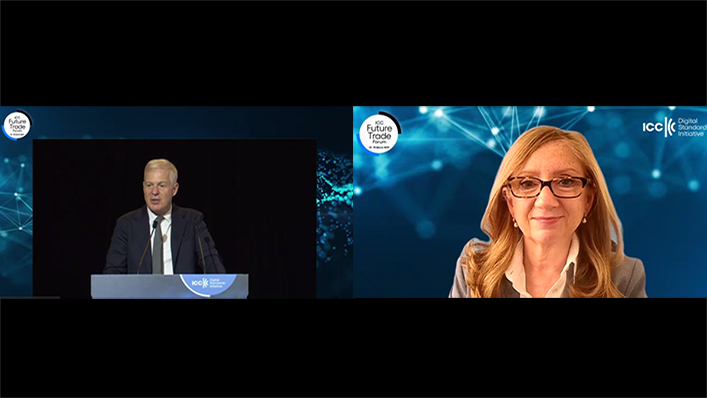
DDG González noted that global merchandise trade has been at record highs since early 2021, and that even with the war in Ukraine, trade has performed a lot better than expected. “But this overall positive picture of trade should not obscure the many forces tugging hard at the seams of the rules-based trading system, from the rise of geopolitical tensions and great power rivalry to the revival of trade-restrictive industrial policies and worrying subsidy races,” she said.
“At a time when we need greater solidarity to tackle climate change, food insecurity and our many other shared challenges, we risk taking a road to nowhere, towards decoupling, self-sufficiency and techno-nationalism,” she noted. “Just think for a moment what this would mean for the future of business, innovation and entrepreneurship, and what it would mean for jobs, growth and living standards around the world.”
DDG González welcomed efforts by the ICC to harness the full potential of digitalization to bring more people, small businesses and local communities into the global economy. “Making digitalization part and parcel of WTO-driven trade facilitation initiatives can be a real game changer, especially for the many small and women-owned businesses that struggle to cope with the high costs of burdensome, time-consuming and opaque trade procedures,” she said.
DDG González also highlighted the need to bring trade policies, regulations and standards up to speed with the reality of a globalized services and digital economy. “This is absolutely necessary if countries want to tap into the rapidly growing area of digitally delivered services, a US$ 3.7 trillion annual export opportunity, for job creation, innovation and economic diversification,” she added.
DDG González stressed that WTO members have taken encouraging steps in the right direction, including by extending the ban on customs duties on electronic transmissions at the WTO’s 12th Ministerial Conference last year. She also highlighted efforts by groups of WTO members to develop rules to facilitate services trade and investment, and to create a more predictable digital trade environment, enhance consumer trust in digital markets and lower digital trade barriers.
“We are making progress, but more is needed, including to ensure that the digital trade agenda moves in tandem with broader efforts to close digital divides,” she said, adding that “this is the only way to ensure that digital trade can act as a bridge to a brighter, more prosperous and secure future for all”.
Share
Reach us to explore global export and import deals